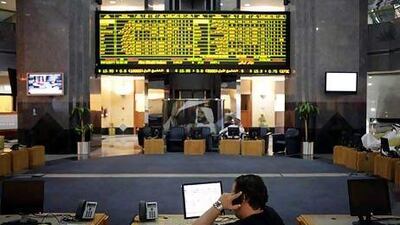Brokers are piling pressure on UAE stock exchanges to reduce trading fees that are 15 times higher than Saudi Arabia's amid depressed market conditions.
The country's two main exchanges, the Abu Dhabi Securities Exchange and the Dubai Financial Market, take a standard fee of 15 basis points per trade. Brokerages are also supposed to take a flat commission of 15 basis points but because of competition for business frequently charge much less.
Saudi Arabia, the largest, most diversified and liquid exchange in the Gulf, which trades at close to US$1 billion (Dh3.67bn) a day, charges a market fee of just 1 basis point. Its brokers are able to charge a flat rate of 10, bringing the total maximum fee of 11 basis points. Calls made to the UAE exchanges were not immediately answered.
"The commission fees have been the top priority on the agenda in meetings with the regulator and the bourses," said Abdel Hadi Al Sadi, the chief operating officer at Al Ramz Securities in Abu Dhabi.
"Brokerages have even expressed flexibility in reducing their own fees because at times it can take days for clients to just cover the cost of the market commission when there is no liquidity."
Dubai Financial Market Company, the only publicly listed stock exchange in the region, is expected to show a decline of almost 50 per cent in profits to Dh650,000 in the fourth quarter compared with the same period the previous year, according to analysts polled by Reuters. The bourse posted a fall of 77 per cent to Dh78.9 million for the full year 2010, still far below the Dh1.41bn figure for the full year 2007 at the peak of the stockmarket boom.
"Commissions are definitely on the high side, but how can you justify it with lower volumes and activity?" said Mohammed Ali Yasin, the chief investment officer at CAPM Investment, which owns Asayel Shares & Bonds brokerage in Abu Dhabi.
"The exchanges will have to reduce the fees if they want to be competitive, especially as they try to attract companies and clients to dual list and trade here."
Trading volumes and equity prices diminished last year, causing the closure of many brokerages, after the Arab Spring and European debt crisis dampened investor sentiment. The value of equities traded by UAE brokerages declined 45 per cent to Dh57bn last year, compared with the previous year. The Abu Dhabi Securities Exchange lost 11.6 per cent, while the Dubai Financial Market General Index lost 16.9 per cent. There are 57 brokerages still in operation in the UAE, down from 103 at the beginning of last year.
While the reduction of market fees is an integral part of the development of the bourses, this factor alone does not make or break investment decisions on the country's markets, according to Sebastien Henin, a portfolio manager at The National Investor in Abu Dhabi.
"As an investor, why do you want to buy a stock? To make a profit," he said.
"The issue is not related to the cost of trading, but the lack of visibility."

